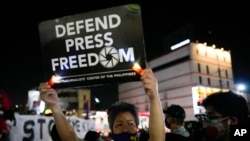Almost "80% of the 263 cases of journalists murdered" in retaliation for their work in the last 10 years have gone unpunished, according to CPJ's 2022 Global Impunity Index.
CPJ accused government officials and the heads of crime cartels for being the suspected perpetrators, adding that it can be challenging to bring those cases to justice.
Reporters in South Sudan, who marked the International Day to End Impunity for Crimes Against Journalists on Wednesday, are urging authorities to ensure the safety and protection of journalists.
Patrick Oyet, chairperson of the South Sudan Union of Journalists, said authorities in South Sudan have detained journalists and shut down media house in 2021 and 2022.
“We don’t have a report on all those who lost their lives as to who killed them, have they been arrested and an investigation taken place. That is to the extreme, of course, let alone the small issues which normally happen, and there is no accountability,” he said.
More than nine journalists have been killed since South Sudan gained independence, Oyet said.
He said he hopes situation will improve as relative peace is holding in the country.
South Sudan’s government spokesman and Information Minister Michael Makuei insisted there is freedom of the press in South Sudan and that no journalist has been sentenced or taken to court for committing a crime.
“The most important thing for a journalist is to strictly observe the rule and regulations of the game; if you don’t do that, then you are lost, and you are not a journalist,” Makuei said.
Elijah Alier Kuai, managing director at South Sudan’s Media Authority, also denied that journalists are behind bars, saying that the treatment of journalists has improved and "reduced in 2022 compared to the past five-year."
John Dunham, deputy chief for political and economic affairs at the U.S. Embassy in Juba, said there has been an increase in the trend of reporters being detained without trial, harassment and even torture by individuals who may have disagreed with the contents of journalists' work.
“It is our job to provoke good journalists, to combat impunity for crimes against journalists, and that task is an honor for us to follow,” said Dunham at an event marking World Impunity Day in Juba.
Danielle Imoya, a South Sudanese journalist working for online media outlet Juba Broadcasting Service, said female journalists face many challenges.
“Journalists are not recognized; they are subjected to harassment. For example, there was a case in the high court that journalists were supposed to cover, and we have obviously been subjected to that kind of harassment by being asking about our identification even when though we had visible features to confirm we are journalists," Imoya said.
A Global Issue
VOA’s Press Freedom Editor Jessica Jerreat said the Somali government’s constant battles with al-Shabab militants make it very difficult to secure justice, adding that militants frequently target amnesty and media workers.
Jerreat said reporters in other countries, including places marked by peacetime and democratic values, also face threats. Mexico "is one of the most dangerous places outside a war zone to be a journalist," she said.
While the Mexican government has provided certain safety measures and allocated a special prosecutor meant address such problems, many journalists still fear for their safety.
“VOA’s press freedom desk, we’ve looked a lot at Mexico these past 18 months, and the journalists we’ve spoken to say these measures don’t go far enough,” Jerreat said.





![SSudan Media Regulator Requires All Journalists Be Accredited [5:57]](https://gdb.voanews.com/093e0000-0a00-0242-dc9e-08da0868a982_w33_r1.jpg)

